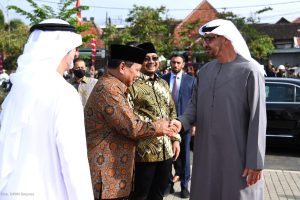The victory of Indonesian Defense Minister Prabowo Subianto at last month’s presidential election marks a pivotal juncture in the nation’s political trajectory. Unofficial tallies show the former general winning the election by a significant margin over his competitors, Anies Baswedan and Ganjar Pranowo, following two unsuccessful attempts at securing the presidency.
Based on quick count tallies conducted by four pollsters across sampling stations nationwide, Prabowo has garnered approximately 58 percent of the votes. These preliminary results underscore a resounding endorsement from the electorate for Prabowo’s vision and leadership.
Prabowo’s victory is likely to have implications for both the country’s domestic affairs and its foreign relations, particularly with regions of strategic importance such as the Middle East. Given Prabowo’s history of engagement with Middle Eastern nations and his personal connections in the region, his presidency has the potential to catalyze a new era of cooperation and partnership between Indonesia and the Middle East.
Indeed, last week, President Sheikh Mohamed bin Zayed of the United Arab Emirates (UAE) conveyed his congratulations to Prabowo for his electoral success. In response, Prabowo committed to maintain and deepen the relationship between Indonesia and the UAE.
There are three reasons why Indonesia-Middle East relations are likely to strengthen under Prabowo. First, during his tenure as defense minister since 2019, Prabowo has actively pursued closer ties with Middle Eastern countries. Notably, in 2021, he spoke at the opening of the International Institute for Strategic Studies’ Strategic Dialogue in Manama, Bahrain, where he underscored Indonesia’s commitment to monitoring security and stability in the Middle East, given the influence of extremist groups in the region that also impact Indonesia. Then, last year, Prabowo visited the UAE at the invitation of Sheikh Mohamed bin Zayed and participated in the IDEX exhibition in Abu Dhabi to promote the Indonesian defense industry. Throughout his term, Prabowo worked towards strengthening military cooperation with Qatar, Saudi Arabia, and other nations in the Middle East. In 2023, for example, Prabowo met with the UAE leaders to discuss defense cooperation. He also brokered a deal to buy second-hand Mirage fighter jets from Qatar, although the deal was recently canceled due to fiscal constraints.
The second factor is Prabowo’s personal rapport with Middle Eastern leaders, exemplified by his longstanding relationship with Prince Abdullah of Jordan, which will add a dimension of trust and camaraderie to Indonesia’s diplomatic endeavors in the region.
Prabowo’s connection with Jordan runs deep. During the 1970s and 1980s, Prabowo established a relationship with Abdullah, the son of King Hussein, while training Jordanian soldiers in Batujajar, Bandung. Their acquaintance soon evolved into a close friendship. Despite hailing from different backgrounds, Prabowo and Abdullah found common ground in their military backgrounds and shared interests.
As a result, in September 1998, after Prabowo was discharged from the military due to alleged human rights violations, he went into voluntary exile in Amman. There he was welcomed by Abdullah and was subsequently appointed a military advisor to the kingdom, while becoming involved in business ventures through his brother’s company, the Tirtamas Group. All of these activities enabled him to delve deeper into the intricacies of Jordanian society and culture. At the time, it was reported that Prabowo’s contributions to bilateral military cooperation between Indonesia and Jordan were formally recognized by the Jordanian government, with the conferment of a prestigious medal of honor.
Third, Prabowo has pledged to continue the policies of President Joko “Jokowi” Widodo, including on relations with the Middle East. Since taking office in 2014, Jokowi has sought to cultivate closer ties with the region. Gulf states donated vaccines to Indonesia during the COVID-19 pandemic and have pledged to play a prominent role in the construction of Indonesia’s new capital city, Nusantara, in East Kalimantan, in addition to other investments.
This sense of continuity will only be strengthened by the fact that Prabowo’s vice president, Gibran Rakabuming Raka, is Jokowi’s son. Gibran met with UAE leaders during his tenure as the mayor of Solo. Notably, under Gibran’s leadership, the UAE took significant steps to solidify ties by constructing a mosque and planning to build a health center in the Central Javanese city.
All told, there are good reasons to believe that Prabowo’s ascent to the Indonesian presidency will lead to a further strengthening of Indonesia-Middle East relations.

































